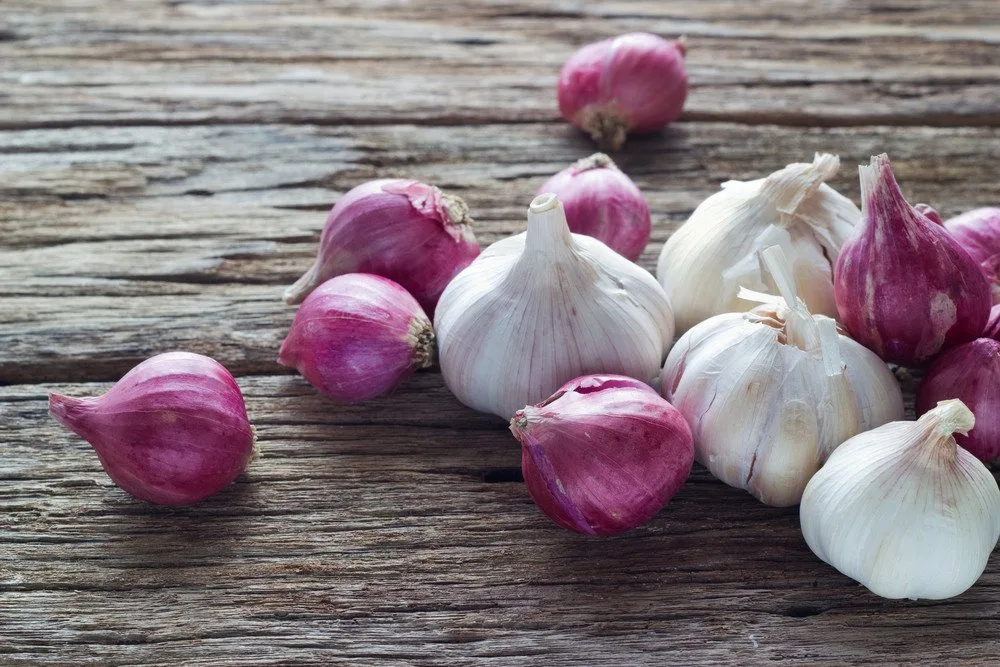These days, science is discovering all kinds of natural ways to lower blood sugar spikes and even reduce fasting blood glucose levels in people with diabetes. Exercise, proper sleep, stress management, supplements, and even drinking the right amount of water are all useful. And, of course, so is the right food.
When we consider using food to fight diabetes, we think about cutting back on refined carbs, eating smaller portions, and maybe including some cinnamon in our smoothies. But onions? They don’t make the list. They should, though. Onions contain quercetin, which is useful against both diabetes and diabetic complications. (1) They’re anti-inflammatory, and inflammation is considered an important factor in diabetes and other metabolic conditions. (2) According to a preliminary study conducted in 2010, onions can help you manage your blood sugar levels. (3)
Research Backs Up the Surprising Power of Onions
The purpose of the study, which took place in Sudan, was to determine whether red onion could be used as a dietary supplement in the management of either type 1 or type 2 diabetes. Researchers studied each group (type 1 and type 2 diabetics) separately, looking at the onion’s effects on both fasting blood glucose and hyperglycemia (which they induced by giving the subjects a dextrose solution – in other words, sugar water).
While the study was small, the results were extremely positive for both type 1 and type 2 diabetes. Let’s look at type 1 first.
Type 1 Results
42 patients with type 1 diabetes were split into two groups, which were each divided into three subgroups of seven subjects each. All the studies involved a fasting period followed by the administration of water (the control group), medication, or fresh red onion slices.
Researchers used the first group to test the effects of onion and insulin on fasting blood glucose levels. After fasting, the control group was given water. The medication group was given 5 IU of insulin, and the onion group consumed 100 g of fresh sliced red onion. Blood glucose levels were measured at the start (when they received the water, insulin, or onion) and one, two, and four hours later.
Levels declined slightly in the control group and significantly in the insulin group. In the onion group, levels increased slightly after an hour and then dropped. After four hours, blood glucose levels had declined by an average of 55 mg/dl in the control group (given water), 89mg/dl in the group who ate the onions, and 145mg/dl for the group receiving insulin.
A simple vegetable offering big benefits
The second group was used to test onion’s ability to improve glucose tolerance. The setup was the same, except that participants were given 75 mg of dextrose to raise their blood sugar levels. Once again the control group was given water, the medication group received 5 IU of insulin, and the onion group consumed 100 g of raw onion.
What the research shows
All three groups experienced an increase at the one-hour mark followed by lower levels at two and four hours. After four hours, the blood sugar levels of the control subgroup (who were given water) decreased by an average of 77mg/dl, compared to 120mg/dl for the onions 153mg/dl for insulin.
Not bad for a simple vegetable!
Now let’s look at what happened when they ran the same experiments on type 2 subjects.
Type 2 Results
The experiments with the type 2 group were identical, except that the patients received glibenclamide at 2mg/kg rather than insulin. Again, the first group was used to test onion’s effect on fasting blood glucose levels.
After four hours, the control subgroup’s average level went down by 16 mg/dl. The onion subgroup experienced an average decline of 40 mg/dl, and the glibenclamide subgroup saw an average drop of 81 mg/dl.
Members of the second group (used to test onion’s ability to improve glucose tolerance) were given dextrose to raise their blood sugar. At the one-hour mark, everyone’s numbers were up. The average for the water subgroup increased by 130 mg/dl, and the glibenclamide subgroup saw a smaller increase of just over 91mg/dl. But the onion subgroup was up by 168 mg/dl, making them temporarily worse off than those having just water.
But at two hours and beyond, the onion subgroup was better off than those on water. After four hours, the control subgroup had gained 75mg/dl, the onion eaters had gained less than 9 mg/dl, and only the glibenclamide group had lowered their blood sugar levels (by 23 mg/dl).
Your Blood Sugar Management Strategy
The researchers were impressed with the results, concluding that red onion clearly lowers blood sugar and could be used as a dietary supplement in the management of both type 1 and type 2 diabetes.
If you’re concerned about your blood sugar levels, why not add some onion to your meals? If 100 grams (about 2/3 cup) of raw onion doesn’t appeal to you, try cooking it or spreading it throughout the day. You could experiment with onions as a side dish, caramelized (here’s a recipe) or pickled. You could make a tomato and onion salad. You could even make an onion pizza!
However you fit them in, it seems onions can play a role in your blood sugar management strategy without depleting your bank account, adding to the list of things you can’t have, or creating serious side effects.
References
-
https://pubmed.ncbi.nlm.nih.gov/35468007/ Yan L, Vaghari-Tabari M, Malakoti F, Moein S, Qujeq D, Yousefi B, Asemi Z. Quercetin: an effective polyphenol in alleviating diabetes and diabetic complications. Crit Rev Food Sci Nutr. 2023;63(28):9163-9186. doi: 10.1080/10408398.2022.2067825. Epub 2022 Apr 25. PMID: 35468007.
-
https://www.sciencedirect.com/science/article/abs/pii/S0023643813001874
-
https://pubmed.ncbi.nlm.nih.gov/21079693/Taj Eldin IM, Ahmed EM, Elwahab H M A. Preliminary Study of the Clinical Hypoglycemic Effects of Allium cepa (Red Onion) in Type 1 and Type 2 Diabetic Patients. Environ Health Insights. 2010 Oct 14;4:71-7. doi: 10.4137/EHI.S5540. PMID: 21079693; PMCID: PMC2978938.





![women [longevity live]](https://longevitylive.com/wp-content/uploads/2020/01/photo-of-women-walking-down-the-street-1116984-100x100.jpg)










